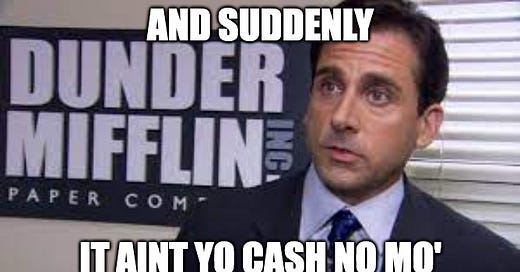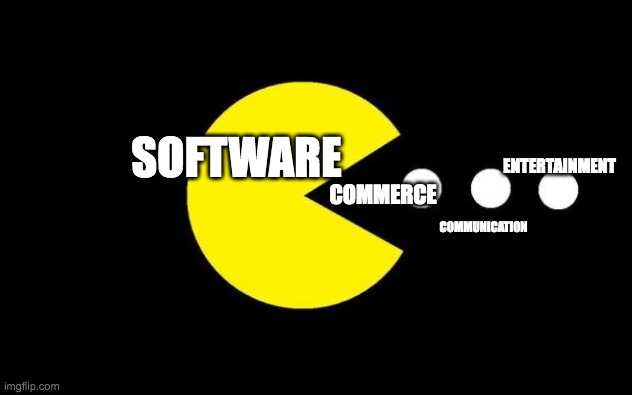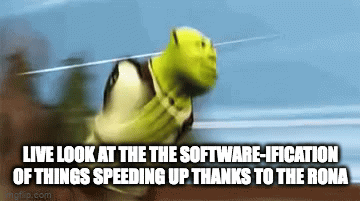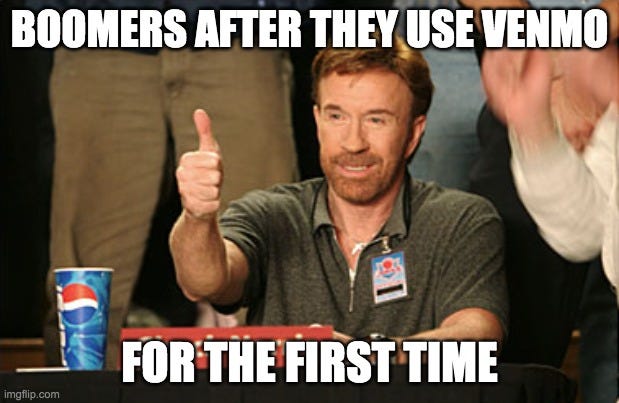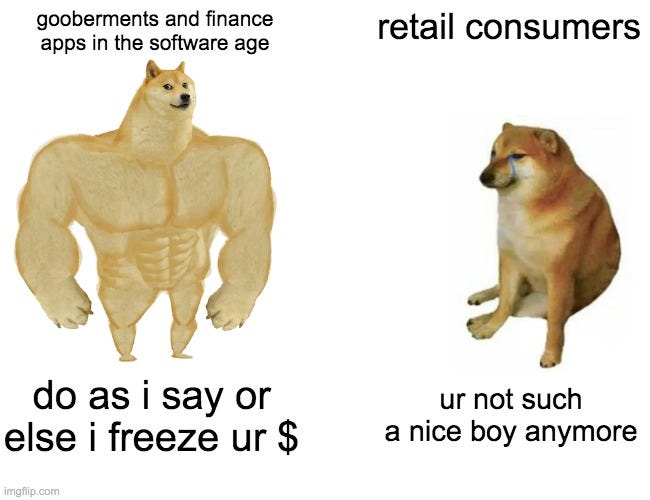yo money is now more online than ever and that’s a bad thing.
Software Is Like Pacman — It Eats Stuff
Software is eating the world, especially in the land of retail consumers. Retail-facing industries like communication, entertainment, and commerce were all transformed in the late 90s and early 2000s.
Communication was hit first, with email and mobile phones absolutely destroying the need for young people to know how to buy stamps. Entertainment fell quickly after, as Netflix is making sure to remind people of by literally creating streaming-based show about the demise of BlockBuster. Commerce is also a dying breed thanks to CEO, entrepreneur, born in 1964, Jeffrey, Jeffrey Bezos and his what-looks-to-be-very-sustainable march towards making things like “malls” and “Barnes and Noble” absolutely obsolete.
In each case, the software-ification of industry has a bunch of secondary effects — both positive and negative. Oftentimes, these secondary effects have more numerous negatives in the light of one glaring positive. Let’s take the software-ification of communication for example:
Positive…
the ability to communicate instantaneously across the world is pretty sweet for building friendships, companies, and communities
Negatives…
people can yell at each other all the time on social media and young people are losing people skills due to being online all the time
bad/mis/dis/mal-information is incredibly easy to spread
in the hand-written note to snapchat transition of young person interactions, a lot of writing skills have been lost
Let’s Talk About Trades Baby, Let’s Talk About T+2
One industry has been slow to get software-ified: finance.
Finance had bucked the software-ification trend for a good while due to much of the banking plumbing relying on laws and infrastructure created in a world without the internet. A fantastic example of how outdated our payment rails are is to look back at the Robinhood debacle of 2021. The trading firm had to stop users from trading GameStop stock because the stock market takes TWO WHOLE DAYS (T+) to settle trades in the US.
But covid-19 forced the world to speedrun the software-ication of everything to a ridiculous degree. Industries like Education, Healthcare, and Finance found themselves trying to keep up in a world where everything needed to be done remotely.
And, so, these industries are now much more online and stuff. For finance (using digital banking google searches as cannon fodder) the numbers are particularly striking:
203 million Americans have a digital banking account and is growing by about 5% per year
Nearly 89% of bank account holders in the US use mobile online banking for managing their accounts.
A survey done in the US shows that only 20% of customers visit the branch office of their banks
The 2020 digital banking statistics showed that the total branch count of the US financial industry reduced by more than 1500 within 12 months
The Good News First
Finance is a bit different from the negative/positive externalities framework than commerce, entertainment, and communication. Instead of having 1 glaring positive and multiple negative secondary affects, the software-ification of finance has led to a few positive secondary effects and one glaring negative.
In the case of finance, the positives go something like this:
it has never been more convenient to send money, buy stocks, and pay bills
it has never been easier to set up a bank account, as the 2021 FDIC National Survey shows
a lot of trading information and money managing advice has been automated (ex: Wealthfront), allowing non-elite people access to trading/investment strategies
These are all good things. You could even make the case they are “great things” when taking into account the growth of personal finance in India and Africa.
In essence, the software-ification has made it easy to control money with just a few clicks of a mouse or touches of a mobile phone.
This is probably positive.
However, as US citizen, there is one GLARING negative effect of the software-ification of finance that makes all the above not matter at all:
just as digital money can now be moved at the click of a button, digital money can be taken away at the click of a button
Let’s Talk About This Kim Kardashian Sized “But” Arising From the Software-ification of Finance
Let me repeat this again, with slightly different phrasing:
as finance has become more software-ified, money has become easier to control than ever.
On Friday I wrote about the history of money in the US.
The 2,000 word article can sort of be summarized to this timeline:
to win The Revolution, paper backed by the promise to win the US revolution was created
that paper was worthless after the war, so the US Mint was created to make precious metals into money
around 1861, metal became too cumbersome and denominations became too high, so paper money backed by gold was created
in 1971 it became to annoying to keep the US dollar backed by gold, so paper money backed by the US government’s promise to be awesome was put into circulation
And now, well, we are still under that 1971 regime but with a massive twist:
that paper money has now been digitized by banks and fintech companies who are regulated by the US government
That means (by transitive property), that the US government is pretty much two steps away from directly controlling your money and the digital banks and fintech companies are one step away from controlling your money…
And this control is even easier than ever as your money has been transformed to bits and bytes rather than physical items thanks to software-ification.
And that is a bit, ahem, scary because the last 12 months have seen countless examples of governments and finance companies using software to halt the flows of money.
Two Real Life Examples of Finance Software-ification Being Used to Control Money
On February 14th, Prime Minister Trudeau invoked the Emergencies Act in response to the “Freedom Convoy” – an anti-vaccination group of truckers who were actively protesting and blockading in Ottawa.
The politics of the so-called Freedom Convoy are contentious and very political.
The Canadian Trucker Association distanced itself from the movement
Far-right, anti-vax leaders, such as Donald Trump Jr., supported it
The feelings of Canadians are mixed.
Trudeau, a member of the Canadian Liberal party, was very active in shutting Covid down within Canada’s borders (so it is no surprise that an anti-vax protest would be met with strict action).
Let’s skip the politics tho. What does this have to do with money?
As part of the Emergencies Act, Canada implemented two laws:
Emergency Economic Measures: prohibited Canadian citizens from gatherings that could lead to a breach of peace (like a convoy of truckers surrounding Ottawa). Notably, the law also banned travelling to any such gather and providing property.
Emergency Economic Measures Order: prohibited any protestor from dealing in property, currency, or financial services and required all registered financial entities to report the holdings, possessions, and transactions of protestors directly to the RCMP or CSIS.
The Emergencies Act led to a wide variety of funds being frozen for 30 days. This was made quite easy by the fact that much of the money was sent using software payment rails, by application or by cryptocurrency.
219 “financial products” were frozen (NYTimes didn’t describe further)
253 Bitcoin Adresses were blocked by Canadian exchanges
$3.8 million in GoFundMe donations were frozen
Of the $10 million raised for Truckers on GoFundMe, only $1 million was actually taken off the system by the campaign lead Tamara Lich, who was later charged with counseling to commit mischief.
Moral of the Story:
A government was able to stop donations and freeze funds to a campaign it didn’t agree with without much effort, as monetary payment rails are just software rails moving bits and bytes.
If you violate the “Acceptable Use Policy” at PayPal, they can just fine you $2,500 at their whim.
At face value, this is a good thing. PayPal’s “Acceptable Use Policy” says things like “don’t sell counterfeit things on a website connected to PayPal” or “don’t use PayPal to break the law”.
Under further scrutiny, however, this policy is a bit dystopian, as it gives PayPal (a software application) the ability to freeze and drain funds from a user’s account without awaiting regulatory jurisdiction.
Moral of the Story:
The biggest financial application has set the precedent that they can fine you $2,500 if you use PayPal for something they don’t approve of.
Conclusion
Ok, dis article is definitely not ready to be published, but I hope my point has been sort of driven home.
It’s a five part thesis I guess:
Software is Eating The World
For Most Industries, This Is GREAT, but has some negative effects
For Finance, This has some positive effects, But Is Bad
Why? Because Software-ification Makes Money Easy To Freeze
Gib Examples? Ok, Canada and PayPal
It should be either 1,000 words shorter or 10,000 words longer for my points to be more efficient.
Maybe one week Bag and I will do a “rewrites” topic.
Until then this has to work,
- kram

